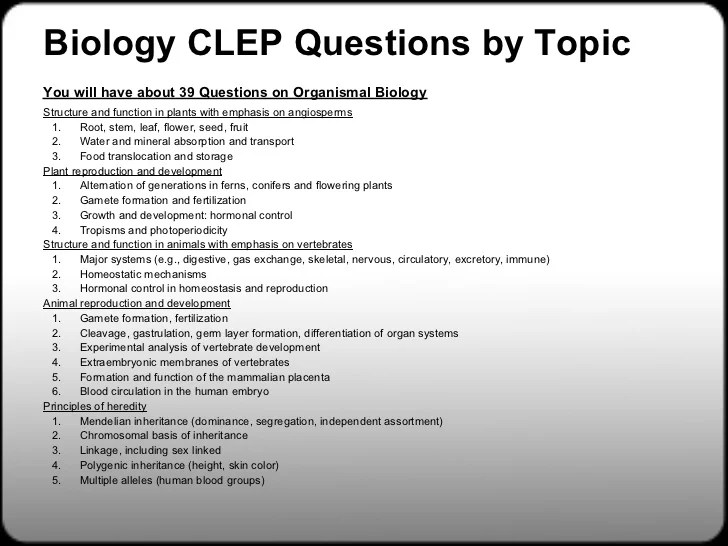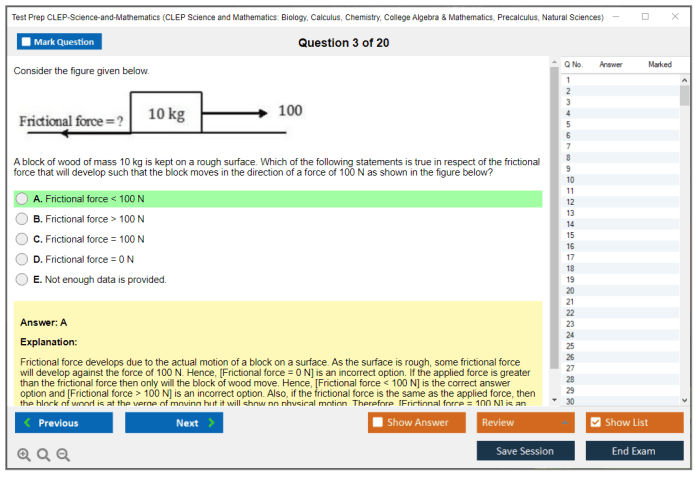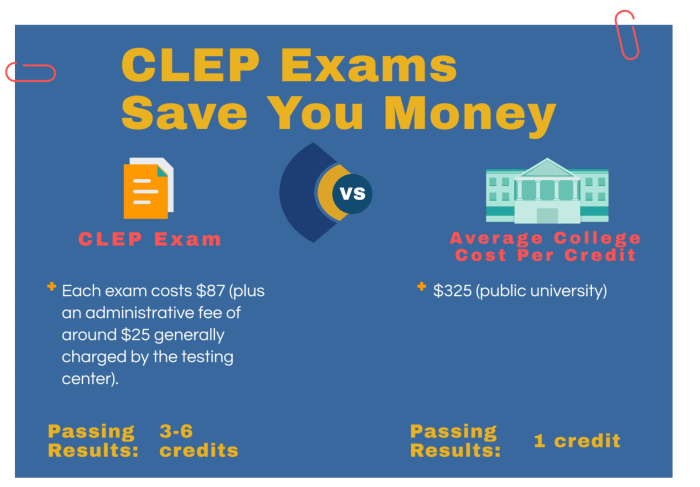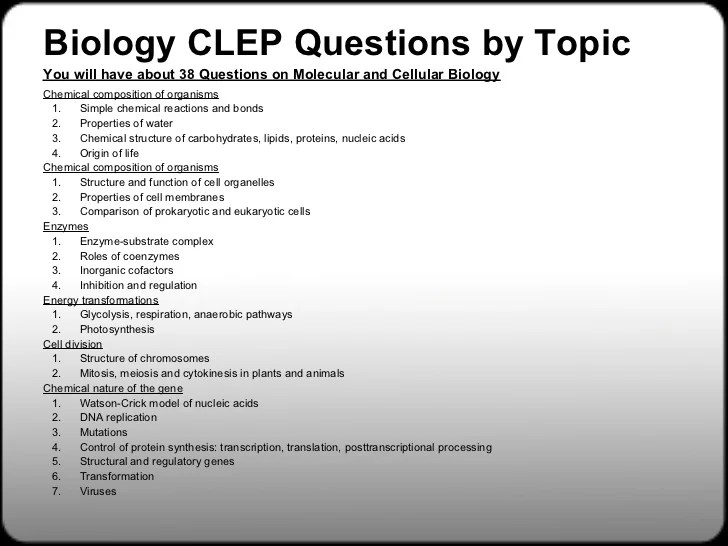Natural sciences clep practice test – Embark on a journey to master the natural sciences with our comprehensive CLEP practice test guide. Dive into the intricacies of biology, chemistry, physics, and astronomy, equipping yourself with the knowledge and strategies to excel on exam day.
Our in-depth review of key concepts, practice questions, and expert guidance will empower you to tackle the CLEP Natural Sciences exam with confidence, maximizing your chances of success.
Introduction to the CLEP Natural Sciences Exam

The CLEP Natural Sciences exam is a college-level examination that assesses a student’s knowledge and understanding of the fundamental concepts and principles of natural sciences.
The exam covers a broad range of topics, including:
- Physical Science: Includes topics like physics and chemistry
- Life Science: Includes topics like biology
- Earth and Space Science: Includes topics like geology and astronomy
The exam is designed to help students earn college credit for their knowledge of natural sciences, which can save them time and money on their education.
Preparing for the CLEP Natural Sciences Exam: Natural Sciences Clep Practice Test

To excel in the CLEP Natural Sciences exam, a comprehensive study plan and effective preparation strategies are crucial. This involves establishing a dedicated study schedule, utilizing a variety of study materials, and implementing effective time management techniques during the exam.
Study Habits
- Establish a regular study schedule:Consistency is key. Set aside specific time slots each day or week for studying and adhere to them.
- Break down the material:Divide the vast amount of information into smaller, manageable chunks. This makes studying less overwhelming and helps you focus on specific concepts.
- Use active learning techniques:Engage with the material through activities such as taking notes, creating flashcards, or teaching the concepts to someone else.
- Take practice tests:Simulate the actual exam experience by taking practice tests. This helps you identify areas that need improvement and familiarizes you with the test format.
Study Materials, Natural sciences clep practice test
- CLEP Official Study Guide:This official guide provides comprehensive coverage of the exam topics and includes practice questions.
- Textbooks:Utilize textbooks from introductory natural science courses to gain a deeper understanding of the fundamental concepts.
- Online resources:Explore websites and online courses that offer interactive lessons, simulations, and practice questions.
Time Management and Exam Strategies
- Manage your time wisely:During the exam, allocate your time effectively to each question, ensuring you have sufficient time to answer all of them.
- Read instructions carefully:Pay attention to the specific instructions for each question and answer accordingly.
- Eliminate incorrect answers:If you are unsure of the correct answer, try to eliminate the obviously incorrect ones first.
- Guess strategically:If you are unable to determine the correct answer, make an educated guess based on the available information.
Content Review for the CLEP Natural Sciences Exam

The CLEP Natural Sciences exam assesses your knowledge of the fundamental concepts in biology, chemistry, physics, and astronomy. To prepare for the exam, it is essential to review these key concepts and understand their interconnectedness.
The scientific method is a systematic approach to investigating and understanding the natural world. It involves making observations, forming hypotheses, conducting experiments, and analyzing data. The scientific method is applied in all areas of natural sciences, allowing scientists to test ideas and develop theories.
Biology
Biology is the study of life and living organisms. Key concepts include cell structure and function, genetics, evolution, and ecology.
- Cell structure and function: Understand the different components of cells, their roles, and how they work together.
- Genetics: Study the principles of inheritance, including Mendelian genetics, DNA structure, and gene expression.
- Evolution: Explore the mechanisms of evolution, such as natural selection and genetic drift, and their role in shaping the diversity of life.
- Ecology: Investigate the interactions between organisms and their environment, including population dynamics, community ecology, and ecosystems.
Chemistry
Chemistry is the study of matter and its properties. Key concepts include atomic structure, chemical bonding, and chemical reactions.
- Atomic structure: Understand the structure of atoms, including the arrangement of protons, neutrons, and electrons.
- Chemical bonding: Explore the different types of chemical bonds, such as ionic, covalent, and metallic bonds, and how they determine the properties of compounds.
- Chemical reactions: Study the principles of chemical reactions, including stoichiometry, equilibrium, and kinetics.
Physics
Physics is the study of energy and matter. Key concepts include mechanics, thermodynamics, electricity, and magnetism.
- Mechanics: Investigate the laws of motion, energy, and momentum, and their applications in real-world scenarios.
- Thermodynamics: Study the principles of heat and energy transfer, including the laws of thermodynamics.
- Electricity: Explore the principles of electricity, including electric fields, circuits, and magnetism.
Astronomy
Astronomy is the study of the universe beyond Earth. Key concepts include the solar system, stars, galaxies, and cosmology.
- Solar system: Understand the structure and composition of the solar system, including the planets, moons, and other celestial bodies.
- Stars: Explore the properties of stars, including their life cycles, stellar evolution, and nuclear fusion.
- Galaxies: Study the structure and evolution of galaxies, including the Milky Way galaxy and other types of galaxies.
- Cosmology: Investigate the origin and evolution of the universe, including the Big Bang theory and the expanding universe.
Practice Tests and Sample Questions
Practice tests and sample questions are valuable tools for students preparing for the CLEP Natural Sciences exam. They provide an opportunity to assess one’s knowledge, identify areas for improvement, and familiarize oneself with the types of questions typically found on the exam.
The CLEP Natural Sciences exam consists of multiple-choice questions covering a wide range of topics in the natural sciences, including biology, chemistry, physics, astronomy, and geology. Practice tests and sample questions can help students gauge their understanding of these topics and identify areas where they need to focus their studies.
Types of Questions
The CLEP Natural Sciences exam typically includes the following types of questions:
- Conceptual questions: These questions test students’ understanding of scientific concepts and principles.
- Problem-solving questions: These questions require students to apply scientific knowledge to solve problems.
- Data analysis questions: These questions require students to analyze data and draw conclusions.
- Experimental design questions: These questions require students to design experiments to test scientific hypotheses.
Benefits of Using Practice Tests
Using practice tests and sample questions offers several benefits for students preparing for the CLEP Natural Sciences exam:
- Identify areas for improvement:Practice tests can help students identify areas where they need to focus their studies. By reviewing the questions they missed or answered incorrectly, students can determine which topics they need to review.
- Familiarize with exam format:Practice tests help students become familiar with the format of the CLEP Natural Sciences exam. This can help reduce anxiety on test day and improve overall performance.
- Build confidence:Practice tests can help students build confidence in their ability to pass the exam. By seeing how well they perform on practice tests, students can gain a sense of accomplishment and motivation.
Test-Taking Strategies for the CLEP Natural Sciences Exam
Approaching the CLEP Natural Sciences exam requires effective test-taking strategies to maximize performance. Understanding the different question types, managing time efficiently, and controlling anxiety are crucial for success.
Question Types and Strategies
- Multiple Choice:Read the question and answer choices carefully. Eliminate incorrect options by identifying inconsistencies or irrelevancies. Choose the most comprehensive and correct answer.
- True/False:Determine if the statement is entirely true or false. Consider the accuracy of the information and any exceptions or limitations.
- Fill-in-the-Blank:Read the context carefully to identify the missing information. Use your knowledge of the topic and educated guesses to fill in the blanks.
- Short Answer:Provide concise and accurate answers to the questions. Use specific examples and evidence to support your responses.
- Essay:Plan your response by outlining the main points and supporting arguments. Organize your thoughts coherently and provide specific examples and evidence.
Pacing and Time Management
Time management is essential during the exam. Allocate a specific amount of time for each question type based on its difficulty. Move on if you encounter a particularly challenging question and return to it later if time permits.
Managing Anxiety and Staying Focused
Anxiety can be a hindrance during the exam. Practice relaxation techniques such as deep breathing or meditation before and during the test. Stay focused by concentrating on the current question and avoiding distractions. Remember that the exam is a measure of your knowledge and not a reflection of your intelligence.
Resources and Additional Information

For further preparation, consider these resources:
- Websites:
- Books:
- CLEP Natural Sciences: Study Guide and Practice Testby Test Prep Books
- CLEP Natural Sciences Crash Courseby REA
- Natural Sciences for CLEP: A Comprehensive Study Guideby David A. Partin
- Organizations:
CLEP Exam Registration and Testing Procedures
To register for the CLEP Natural Sciences exam, visit the College Board website . The exam is typically administered at testing centers and costs $89.
On test day, bring a valid ID and arrive early. The exam consists of 120 multiple-choice questions and has a time limit of 90 minutes. A passing score is 50 out of 80.
Success Stories and Testimonials
Many students have successfully passed the CLEP Natural Sciences exam and earned college credit. Here are a few testimonials:
“I was able to pass the CLEP Natural Sciences exam and earn 8 credits towards my degree. It was a great way to save time and money.”
Sarah J.
“The CLEP Natural Sciences exam was challenging, but I was well-prepared thanks to the resources I used. I’m glad I took the exam and earned college credit for my knowledge.”
John B.
FAQ Corner
What is the CLEP Natural Sciences exam?
The CLEP Natural Sciences exam is a college-level examination that assesses your knowledge in biology, chemistry, physics, and astronomy. Passing the exam can earn you college credit and save you time and money on your degree.
How do I prepare for the CLEP Natural Sciences exam?
To prepare for the CLEP Natural Sciences exam, you should study the key concepts in each subject area, take practice tests, and develop effective test-taking strategies.
What are the benefits of taking the CLEP Natural Sciences exam?
Taking the CLEP Natural Sciences exam can save you time and money on your degree, allow you to test out of introductory science courses, and demonstrate your knowledge in the natural sciences.